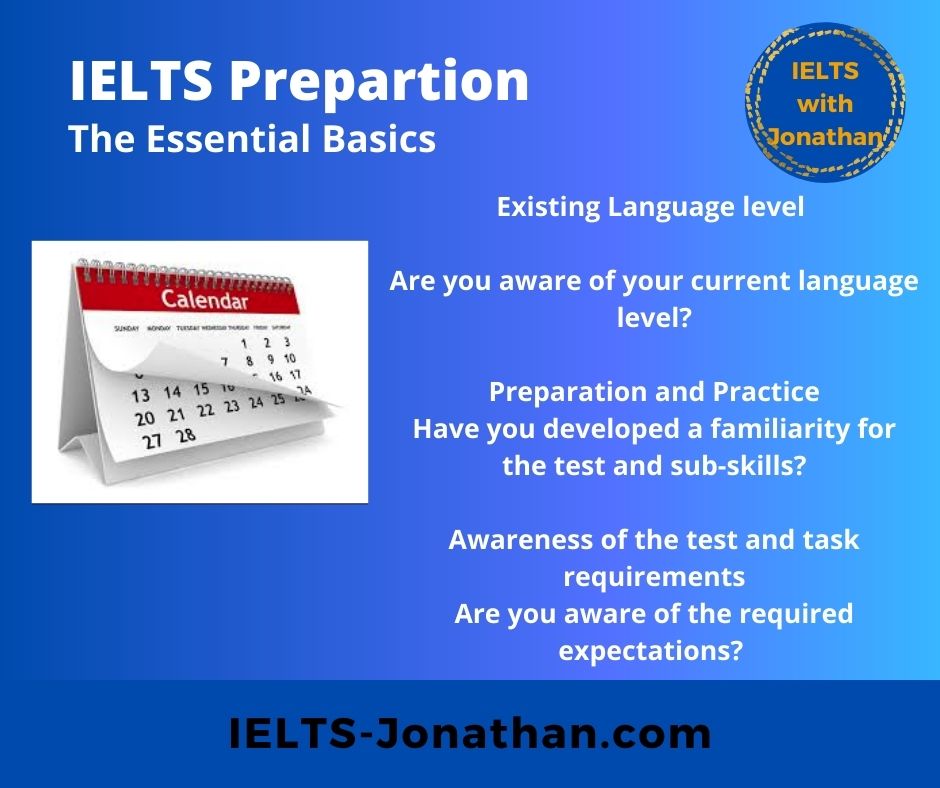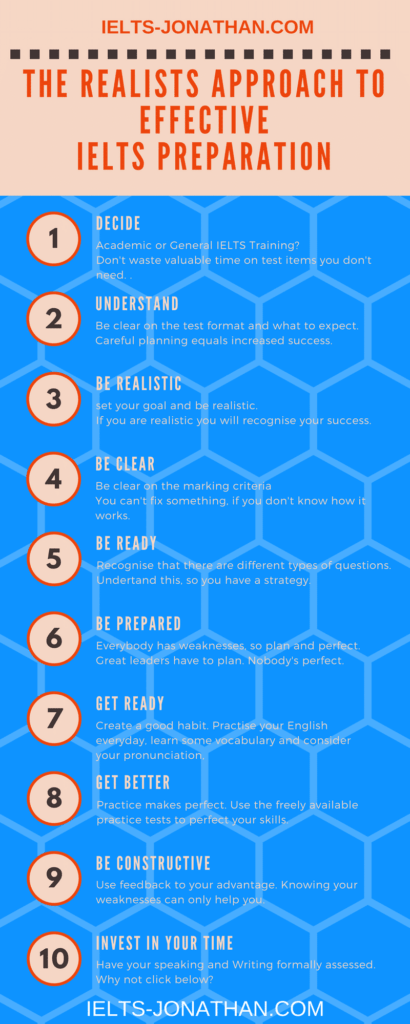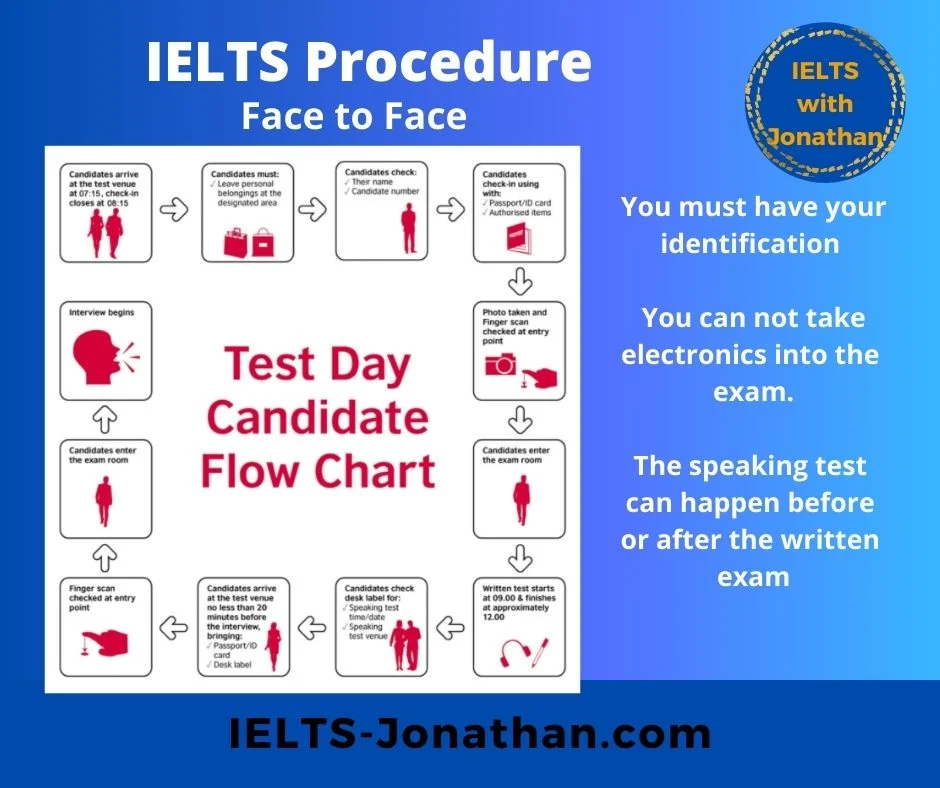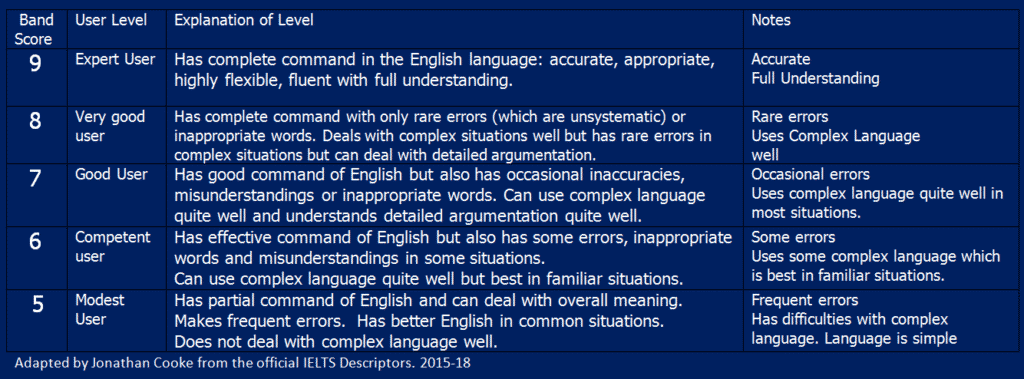The Important Steps For IELTS Success.
Whether IELTS is for school, university, work or emigration, once you have decided to take the IELTS test, the most effective thing that you can do is produce a study plan that is both effective and achievable.
How to approach IELTS
Much like a course book that’s designed logically in terms of structure and use of time, doing IELTS preparation the correct way will save you time and money.
It will also help you to effectively prepare and get that test score you need.
There’s lots of advice about preparation online and some of it is conflicting. That’s a challenge if you are new to the the IELTS test.
So I am going to give you information I think the majority of test takers need to know about preparing for the test and the best preparation tips.
I will also be looking closely at the IELTS test and considering an action plan, using freely available materials you can find online.
But first of all, I have a question for you.
Is IELTS a hard language test?
To answer the question above, you need to be aware of the pressure that most IELTS candidates experience.
IELTS can be hard work, time-consuming and expensive in both tuition and wasted test fees.
To make matters worse, with so much available information online it is difficult to know which advice is really good advice.
Using poor, inaccurate or just the wrong materials or advice will make IELTS very hard.
Many students don’t get the score they want the first time
Let’s be clear, the three main things that you need to do to improve your test score are
- improve your level of English,
- improve your test skills and
- improve your understanding and the requirements of the test.
Not being aware of these three points will make getting the score you need much harder and much longer.
Look at your general level of English first.
Always consider your general level of English first.
IELTS is without question an English language test. Simply put, the higher the level of your English, in theory, the higher your IELTS score. So many students don’t get the score they want, because their English level is not yet high enough.
If your level is low, improving your language ability should be a top priority.
How can I test my English level?
If you are taking English classes, get your teacher to set you a level test. If you’re joining an English class for example, in a school, you will be given a entrance test to find out your level. Once you know your test level, you can use frameworks to devise a language self-improvement plan.
However, it is generally the slowest part of the journey to the IELTS score you need. Research has shown that it takes around 6 months of moderate study to improve by 0.5 band score.
But there are small things you can do to improve your score overall.
Native Speaker’s English level
What about a Native Speakers English level? Can they easily pass the IELTS?
In contrast to learners of English, IELTS candidates with good English and even Native speakers get low scores, simply because of common mistakes or an approach to the task that that lowers their IELTS band.
This is often due to a lack of preparation.
So it is obvious that self-studying and some practice is needed by all IELTS candidates and it’s not simply a matter of doing a few practice tests online.
Even Native speakers can fail to get the score they need.
Remember IELTS is a language test, and not a general knowledge test, aptitude test or even an IQ test.
Developing essential IELTS skills.
Let’s now look at the skills you need.
IELTS is a language test, rather than an aptitude test.
There are four parts that test aspects of your language ability –
- These are Writing and Speaking, your active language skills, and
- Listening and Reading, your passive language skills.
And within each of these four parts are many different types of question possibilities that are designed to test a particular sub skill.
Let me give you an example:
- For the academic IELTS paper you need to be familiar with seven different types of question designed by IELTS and each of these questions require knowledge of a specific skill.
- Both the Reading and Listening test feature over ten different types of question, which each require a different task strategy and sub skill designed to test a academic skill such as recognising an position or opinion.
- The Speaking test has three basic question types that demonstrate three different skills at progressively different skill levels. One example is a monologue of 2 minutes.
Student mistakes
Most classroom time is spent developing the skills above in conjuncture with language acquisition and this should result in a good score.
It is important to recognise that acquisition and preparation are both essential elements of IELTS practice and preparation, even for native speakers.
As a general language specialist, for non-native speakers I recommend 3 to 4 months active language preparation is required to develop the skills needed for a higher score and I believe most respected language schools would agree too.
Too often than not, I have seen students sit passively in class, and then wonder why after 2 or 3 months they have not made any visible progress.
As a IELTS student who has made the commitment to take the exam, you actively need to look at improving your language skills and preparing for the test.
Understanding questions and requirements of the tasks.
Finally, let’s consider understanding the task and the requirements of the task.
The greatest way you can improve your test score is understanding what the examiners are trained to do as they are experts in their field.
Once you have done that, you should learn to give the examiner what they want on the test day.
An IELTS Task 1 report always requires an overview and a Part 2 monologue requires you to be fluent and coherent. Learn what the examiner expects to see.
Native Students
The biggest issue I think students have, and this includes even native-speaker candidates, is not understanding the requirements of the task.
Using slang or informal language in essays or giving short answers in Part 1 are some of the many mistakes I’ve seen from native speakers.
In this example, language is inappropriate and lacking for the examiner to form an opinion.
So remember this understanding should always be combined with improving your language level and test skills.
Examine the official IELTS marking criteria to help you be clear what the examiner wants and needs to give you the score you want.
You can find more information about IELTS bands in How the Reading and Listening Bands are scored and IELTS Band Equivalents?
In Conclusion
In conclusion, in order to get the highest BAND score, ability, preparation and strategy are the keys to success.
So what are the most effective things you can do for that BAND score you need.
The Realists Approach to Effective Preparation
1. Decide whether you are taking Academic or General IELTS Training
If you are looking to train or study at below degree level, work or undertake work-related training in an English-speaking country or are emigrating to an English-speaking country, such as Australia or New Zealand, and need a visa to work, you are likely to need the General IELTS Training unless you are told otherwise. You should refer to the individual embassy of the country of emigration.
For the list of embassies in the UK
If you are looking to study at university at undergraduate or postgraduate level or join a professional organisation in an English-speaking country you need Academic IELTS Training.
For Masters, Bachelor degree and Pre-sessional university courses entrance, Academic IELTS Training is the requirement.
For more information on university entrance
UCAS United Kingdom – International Students
IELTS also applies to work visas for professional organisations such as the Nursing and Midwifery Council.
For example,
Nurses and midwives taking the IELTS test in the UK must achieve:
- at least 7.0 in the listening and reading sections
- at least 7.0 in the speaking sections
- at least 6.5 in the writing section, and
- at least 7.0 (out of a possible 9) overall.
More information for nurses can be found here
From 2022, the IELTS Test will be available completely online so this is another aspect worth considering. There are some implications.
For some people it may be better to take it face-to-face, and for others they may prefer the convenience of the test from their home.
2. Understand the IELTS Test Format and what to expect
Be absolutely clear about what to expect in the exam. If you know what to expect,you can be more effective in your planning. I have made a poster that simply explains the IELTS Test format for the face-to face test. The same principles apply to the online test too.
Click below. It’s free to keep.
3. Be Realistic and Set Realistic Goals
“I set myself clear, realistic goals…and I work hard to achieve them”
- What do you hope to achieve in life?
- Realistic daily, monthly and yearly goals are important. Write them down and believe in them. You can always change your goals in the future but you can’t if you haven’t made any.
- Don’t compare yourself to others. People are different. Focus on your own path and individual aims.
- “If you have a goal write it down. If you do not write it down, you do not have a goal, you have a wish” (Steve Maraboli) and if you have no goal, then you cannot make a plan.
I’ve prepared some notes about goal setting and using your time wisely here click below.
If you would like the full text.
4. Understand the Marking criteria in all parts
It can be quite confusing to understand how IELTS is scored, especially if you look at the public marking criteria, but my explanation will help you.
The Official Public IELTS Marking Criteria
5. Understand that there are different types of questions
As IELTS is a language test, it is therefore designed to mimic the language tasks you might reasonably expect to meet in your working or university life.
For example, in IELTS Speaking there are 3 parts and the questions asked by the examiner basically have three functions but become progressively more challenging.
Similarly, there are more than 10 question types in Writing, Reading and Listening.
Having an understanding of each type of questions will help you approach the task more effectively and with a strategy.
Understanding the Speaking Test
6. Understand your weaknesses, then plan and perfect your IELTS Skills
Without understanding your weaknesses, there is no opportunity for improvement and there is no strategy that can completely overcome a weakness.
More often than not, students consistently get the score they don’t want, because they don’t recognise their weakness (and there is no feedback after the exam).
Ask yourself some basic questions, what is the most effective way to write an introduction and can you do it, are you able to write at length, can you read and summarise significant features, do you know when to skim or scan read.
If you have a current teacher, quiz them. If they are professional, they should respond positively to your questions, but you then need to react to their response.
If you don’t have a teacher, you can use my Correction Service to give you the valuable feedback you need.
7. Improve your vocabulary
As you saw from the posters above, the vocabulary you use accounts for 25 % of your individual band in both Speaking and Writing.
Naturally, the Listening and Reading sections test your vocabulary too.
To memorise a piece of vocabulary, research has shown that the vocabulary needs to be used at least three times for any chance of it being retained.
However, there is a big difference between knowing a word (passive knowledge) and being able to use it effectively (active knowledge).
Simply memorising words is not an effective strategy for IELTS.
I have a free guide for effective vocabulary improvement.
8. Create a good habit and practice English everyday
Practice makes perfect is a well-used expression in English but it is often not the most effective method for learning a language.
Imagine revising for an exam and how painful that can be or reading a vocabulary list when you are focused on something completely different.
Ok, that might work for some, but as a language specialist, I understand that to make learning effective it needs to be pleasurable.
In my opinion, ‘little and often‘ is a much more effective method and certainly leads to more positive results. This also applies to test skills and test knowledge.
There are many ways that you can practice English at home, without a teacher and for free.
I have made a couple of booklets that feature my personal favourite resources and there is further advice inside. You can look at them in my article here.
IELTS Resources to use outside of class
If you want to focus on core exam topics in IELTS, then it is relatively easy to use a wide range of free resources to get a good background knowledge of core topics that commonly feature in IELTS, such as technology, education and social issues.
IELTS Popular topics in the IELTS Test.
9. Practice makes Perfect. Use the freely available Practice Tests (within reason)
There are two very good reasons for using the free IELTS practice tests that are available online. If you feel comfortable in completing the task, then you should get some feedback so you can estimate your IELTS score. And the more practice you do, the more you will have a better understanding of the test, and the better you will be able to cope under real exam conditions.
However, like many things online, there are plenty of unofficial test papers that are written poorly, contain errors and don’t reflect the nature or purpose of official IELTS tests.
Therefore, I have made an up-to-date list of the best sources of past papers available online.
| Click here for Vol. 1 Official IELTS Practice Materials CD |
| Click here for Vol. 2 Official IELTS Practice Materials DVD |
But remember the ‘little and often’ mantra in point 8 above, and remember that a strategy focussed in one area only is unlikely to be effective.
Far better is a global strategy of General Language, IELTS Skills and Task Understanding in general.
10. Use feedback to your advantage
The main reason that you should consider feedback is that reports consistently state that having an understanding of feedback and being able to reflect on comments of your performance is an essential component of understanding how to improve your own performance in assessments.
This indicates then that spending time understanding feedback will lead to a higher standard of work and understanding overall.
You can get good feedback from your current teacher, if you ask, but you can also get feedback in the courses I personally run.
So there it is, my general advice for language learners and native speakers.
I hope this helps with your IELTS preparation success.
Jonathan
I’m Jonathan I’ve taught IELTS and University English in more than a dozen universities and schools around the world. I’m a parent, traveller and passionate about language teaching and helping students achieve their dreams. Whilst living in Austria or working in Asia, I run IELTS courses to help students get to where they want to be. If you are serious about IELTS, connect with me to see how I can help you.
Share this:
- Click to share on Twitter (Opens in new window)
- Click to share on Facebook (Opens in new window)
- Click to share on Pinterest (Opens in new window)
- Click to share on WhatsApp (Opens in new window)
- Click to share on Telegram (Opens in new window)
- Click to share on Tumblr (Opens in new window)
- Click to share on LinkedIn (Opens in new window)
- Click to print (Opens in new window)










Was this helpful? Leave a comment :)